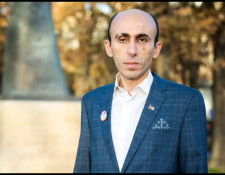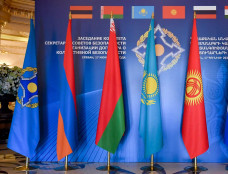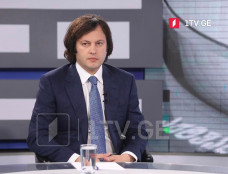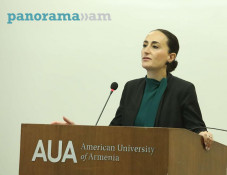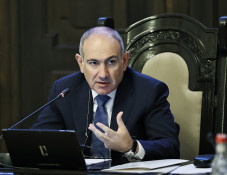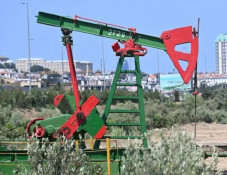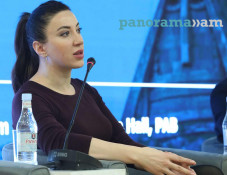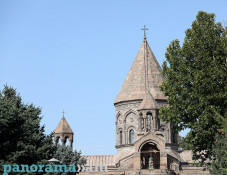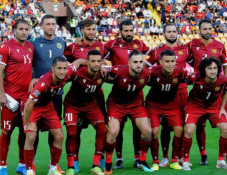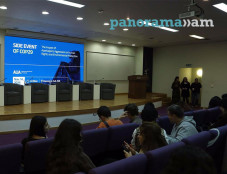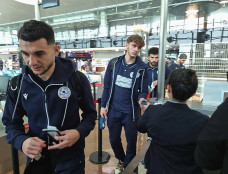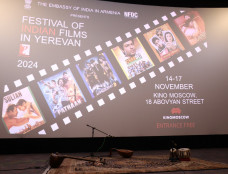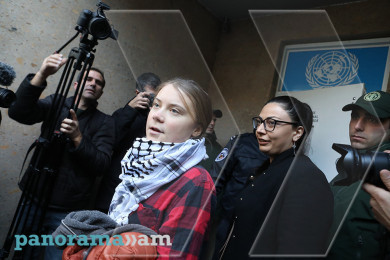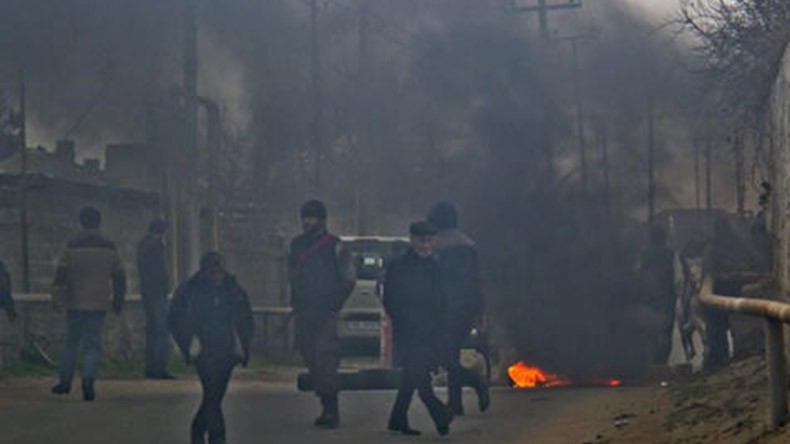
Azerbaijan spiritual leader attempts to blame Armenia in Islamist protest in Nardaran
Allahshukur Pashazade, the chairman of the Caucasian Muslim Board and the spiritual leader of Azerbaijan, said that Armenia is Azerbaijan’s enemy, which allegedly wants to organise disorder in Azerbaijan.
Pashazade claims that the tattoos on the bodies of the Islamists detained during the special operation in Nardaran are allegedly ‘Armenian symbols,’ Azerbaijan’s APA news agency reports.
A swastika-shaped tattoo, and another, depicting grey wolves, both unrelated to Armenian symbolism, were found in the body of one of the Islamists killed during the clashes. Earlier, Azerbaijani MPs and several experts accused different ‘outside forces,’ including Iran, of Nardaran events.
Haqqin.az reports that commemorations were held in city Ardabil, Iran, for those killed during the clashes between Azerbaijan Interior Ministry officers and the supporters of the leader of the movement Muslims Unity, Taleh Bagirzade. A special poster informing about the recent events in Nardaran was put up in Ardabil. Iran declared the killed Islamists shehids and martyrs.
According to the report, another campaign in favour of the killed Islamists took place in front of the Azerbaijani Embassy in Moscow. Unknown people stuck the photos of those killed and of the arrested Taleh Bagirzade on the concrete walls. Flowers were put to those photos.
According to Minval.az, the authorities managed to turn the events in Nardaran in their favour and complete the process. “It must be confessed that the Azerbaijani authorities could not totally control Nardaran, it appeared to be possible only with the use of force. However, grounds or at least excuses were needed to use force,” the website writes and adds that it were Taleh Bagirzade and his surroundings who provided the authorities with that excuse.
According to Turan agency, the situation remained tense in Nardaran on 3 December. All the streets around and inside the suburb were still under the police and Internal Troops’ control, and additional barriers started to be made at the main entrances to the suburb. The special operation was still on in the suburb and only the cars taking bread were allowed to enter. Armoured vehicles were still in the suburb. Journalists and unauthorised people were not let in. Electricity and gas supply was not yet restored.
According to Haqqin.az, many residents of the settlements near Nardaran faced problems moving freely because of the security checkpoints set at the entrances to the suburb, which limit the residents’ movement in the direction of Baku.
The Caucasian Knot writes that Natig Karimov, the elder of the village, said that until recently, they were told that the village residents’ debt for electricity was only half million manats, but now they say it is 42 million. He also said that the authorities’ claims that the constitutional order was being restored in the suburb were not true. Local authorities have always operated in Nardaran and Azerbaijani flags have always hung there. He explained that the black flags were put up there for the mourning month of Muharram.
Turan reports that the Committee to Protect Civil Society held a special meeting over the situation in Nardaran. During the discussion, the committee members said that the operation held in Nardaran on 26 November by the law enforcement officers to neutralise the ‘radical extremist group’ rises serious suspicions as it was conducted with an excessive demonstration of force in a public place without weighty reasons. “The people’s deaths, among both the law enforcement and the worshippers in Nardaran mosque, as well as all the actions the law enforcement carried out in Nardaran, including the blockade of the village, the electricity and gas cut-off, prove that the whole population of Nardaran, including women, old people and children, were targeted rather than a separate group,” the Committee said in a statement.
It is highlighted that the people suspected of involvement in illegal actions could have been arrested any time individually without human, moral and material losses. “Such actions come as a large-scale violation of human rights in a separately taken settlement. Force cannot be used against the Azerbaijani citizens to punish them just because they think in a different way and want to live in accord with the domestic traditions of their community,” the Committee pointed out.
The Committee reproaches the authorities’ refusal of the village elders’ offer to negotiate as ‘they are called authorities because they are supposed to go in dialogue with all the citizens in the framework of the multiculturalism policy declared by the president,’ rather than cracking down on the citizens with the use of force.
Trend agency reports that video cameras and security systems will be installed in the mosques in Azerbaijan. The head of the State Committee for work with religious organisations of Azerbaijan, Mubariz Gurbanli, said parishioners should perform namaz in mosques instead of preaching.
Modern.az reports that as a result of the events in the Baku suburb, Azerbaijani Parliament has adopted laws prohibiting the spiritual leaders, who have received religious education abroad, to carry out Muslim rites and ceremonies inside the country. According to the amendments, only the citizens, who have received suitable religious education in Azerbaijan, have the right to carry out Muslim rites.
Alesker Mammadli, lawyer and media expert, says if the amendment comes into effect, the spiritual leader of Azerbaijan, Allahshukur Pashazade, will be deprived of his right to conduct rites, too.
“According to the new law, those who have studied abroad, cannot conduct religious ceremonies in Azerbaijan any more. As it comes into force, the Sheikh (Allahshukur Pashazade, – ed.) will not be able to conduct rites, either, because he has received his religious education in Uzbekistan. The new law declares ‘unsuitable’ everyone, who has received theological education and studied religious sociology, philosophy and law abroad,” the expert noted.
According to the Scientific Community of Caucasologists , the activities of the movement Muslims Unity headed by Taleh Bagirzade have earlier faced both the Azerbaijani authorities and Caucasian Muslim Board’s sharp criticism. According to the website, some outlets’ reports were close to calling the events ‘a rebellion in the country intending to shift the authorities to theocracy resembling that in Iran.’ The authorities’ opponents point out that no such operation resulting in victims had ever been carried out against the supporters of radical Salafist ideas or the followers of Nursism.
The Community notes that the fame of a ‘Shia stronghold’ has been attached to Nardaran and another Baku suburb, Mashtaga, since the Soviet times. The locals of the suburb devoutly observed the religious rites even when everything reminding of religion was being exterminated with clerics being outlawed. “The authorities of the ruling party of the Azerbaijan SSR had to reckon with Nardaran’s Shia spirit. Even the party leader of Soviet Azerbaijan, Mir Jafar Baghirov, whose name was used by the people in Azerbaijan to scare each other, was not able to eliminate the deeply rooted anti-Soviet spirit of the Baku suburb of flower-growers,” the Caucasologists highlight. They note that all the authorities managed to do was arresting two or three akhoond preachers; however, new people came to replace them and everything started all over again.
On 26 November, armed clashes occurred between the leader of the Shia Islamists of Azerbaijan, Taleh Bagirzade (Taleh Bagirov), and his supporters and the police in the settlement Nardaran 25 km to the north from Baku. Seven were killed during the clashes, including two police officers and five believers. Law enforcement agencies said police had detained 15 Islamists including Taleh Bagirzade during the special operation. Criminal case was initiated against all the detainees and four-month arrest was used as preventive measure against them.
According to the reports, the police carried out the special operation during the daytime prayer inciting the believers’ strong discontent. A group of Special Forces in black masks broke into the shrine Huseyniyye, where Muslims were praying, and threw smoke bombs inside. Then they pushed black sacks on Taleh Bagirzade and some others’ heads and dragged them out of the place. In addition, some drugs were given to several people, which made them faint. Immediately after that, mass unrest broke out in Nardaran. The village had no electricity and telephone communication, police cars and armoured vehicles blocked the streets. The locals also started to complain of the lack of food supplies because of the limited access of trading companies’ cars into the settlement. Nardaran was practically in blockade.
Newsfeed
Videos






